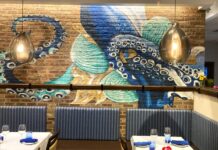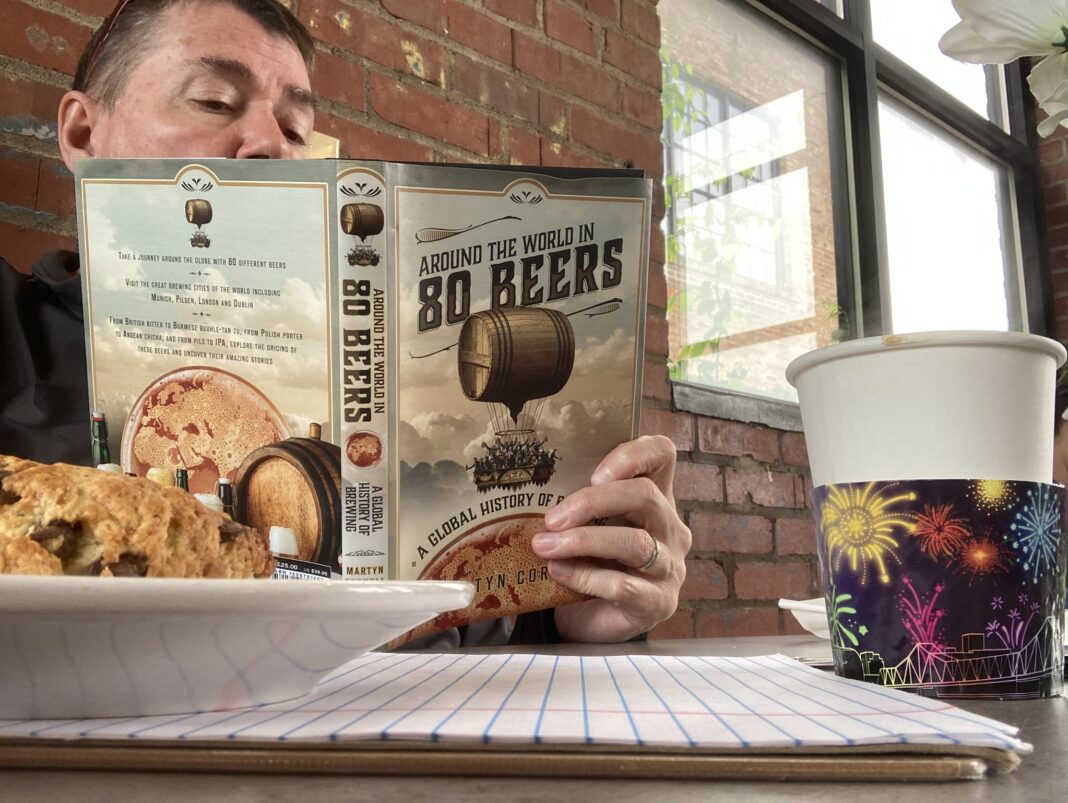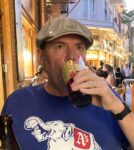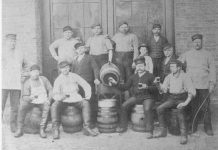Just because the “Hip Hops” column is about beer, it doesn’t mean that beer must be the subject of a “Hip Hops” column.
Rather, it might be possible to make an indirect yet principled point about beer while barely mentioning it, happily freeing those afflicted with our current era’s short attention spans to engage in full pursuit of this year’s bitcoin-encrusted Captain Crunch Tequila Barrel Aged Imperial Cream Ale release, thus allowing the remainder us to caress the supple nuances of a well-turned Czech pilsner.
As such, this week’s column begins with the words of musician, bandleader and composer Duke Ellington, of which we’ll hasten to understand his intended meaning.
“Music is my mistress, and she plays second fiddle to no one.”
Nowadays the noun “mistress” generally is used to reference an unsavory male power relationship in which the woman is subservient, but the primary definition of the word is different and more positive: “A woman who has power, authority, or ownership.”
Ellington emphatically did not view music as something he controlled and kept in its place, to be shielded from view in an efficiency apartment until he needed it to assuage his desires, even if he had a girlfriend in more than one city (and we’re told he did). If anything, it was the other way around. Music was his life, and music set the tempo.
Ellington (1899-1974) was a pianist and orchestra leader in the then-dominant idioms of jazz, big band and swing. To me, he remains one of America’s foremost composers in any musical genre.
My parents raised me on music like Ellington’s, and when I was a kid they took me to see a performance of his in Louisville. The rock and roll bug subsequently bit me, yet I’m eternally grateful to have been exposed to these old-school variants of American music. They’re among our greatest contributions to planetary culture, and remain huge daily components of my internal soundtrack.
We all hear music differently, and as noted oft times before, my own default calibration prefers catchier tunes. “Melodic,” if you will. Ellington wrote his share of these, capable of being whistled while strolling or “interpreted” in the shower — and selling a few 78 rpm records in the process.
Music is a big tent, and a well-constructed pop ditty with a hook means as much to me as a classical concerto or Ellington’s own extended suites of conceptual music.
Moving right along, there is no rational way to make the transition from “music is my mistress” to “living in the material world,” so I won’t even try. Ten years after Ellington passed from the scene a talented woman by the name of Madonna Louise Ciccone had a hit with “Borderline,” a song written by Reggie Lucas.
I heard a snippet a few weeks ago while shopping for groceries, and devolved into a reverie amid the canned vegetable aisle. As surprising as it might seem for casual readers, “Borderline” is a favorite song of mine. Granted, I’d never seek to compare it to Ellington’s “Mood Indigo,” although “I Got It Bad (and That Ain’t Good)” perhaps functions as a serviceable parallel. Ladies and gentlemen, Ivie Anderson.
“Borderline” always prompts a smile because from nothing more than sheer serendipity, it became a theme song for my early European trips. I didn’t pick the song; it picked me, because that’s the way music works. From the first expedition in 1985 through mid-1990s, it seemed as if whenever I was packing my bag for a trip “Borderline” would play on the radio.
(Radio? That’s an increasingly antiquated music dissemination device. Like I said, I’m antiquated.)
Indeed, different strokes; lightweight ear candy to some, symbolic prelude to others. Borderlines are for containment, and also for crossing. I had an easy life growing up as a white middle-class male, with no wars to go fight, compulsions to attain wealth or lasting romantic ties (until later).
What I needed most was a kick in the butt. It surprised even me when this jolt became self-administered.
For 1,001 tiny incremental reasons, my becoming obsessed with the idea of roaming through Europe became the foundational theme tying together all the topics of the human experience that struck me as interesting.
Neither internal combustion nor deer hunting was among them. Selling insurance, widgets or houses? Nope. Mathematics absolutely wasn’t a priority, but reading and writing hit closer to the center of the target. What excited me the most at the outset of my European travel career 40 years ago was history, geography, literature, music and art, as components of what we call the Western canon.
The Western canon is the body of books, music, and art that scholars generally accept as the most important and influential in shaping Western culture. It includes works of fiction, non-fiction, poetry, drama, music, art, sculpture, and architecture generally perceived as being of major artistic merit and representing the high culture of Europe and North America. Philosopher John Searle suggests that the Western canon can be roughly defined as “a certain Western intellectual tradition that goes from, say, Socrates to Wittgenstein in philosophy, and from Homer to James Joyce in literature”.
My own “borderline” was located and surpassed when I finally accepted that incessantly craving an ever greater exposure to this body of knowledge wasn’t a bad thing for a hick from somewhere near French Lick. In fact it was a very good thing, and the pursuit of culture made me happy. Maybe “The Rite of Spring” would have been preferable to Madonna; to each their own. It’s best to accept revelations wherever they originate.
I chased knowledge for its own sake, not because it would lead to a better job or a higher standard of living. Piles of excess money beyond the minimum required to get by, while allowing an escape every now and then, were never much of a priority or motivation for me.
Four decades later (and counting), an ongoing immunity to the supposed imperative of capital accumulation renders me only shakily American, especially since January, 2025. Except I was sure that knowing these things would make me a better person, and after college when funding was tight, a lot of it came free of charge.
Reading, studying and listening at local libraries (those vicious socialist institutions) were essential to preparing for trips as well as maintaining my sanity when the prevailing philistinism became too much to bear.
Later, when there was more disposable income for books and CDs, the cash went for them and not fashionable clothing, power tools or fancy sports cars. There isn’t anything wrong with any of these discretionary items; they just weren’t for me. These days books, music and art surround us at home, and they’re still representative of mental equilibrium when travel isn’t possible. I can’t imagine life without them.
There’s a sobering realization that in the end, for all one’s efforts, a lifetime of learning counts for little more than skimming the surface. However, this doesn’t deter me or intrude on my idealistic dreams. I’m eager to carry a few fragments of those past manifestations of thought forward for the benefit of the next generation.
If you tell the story in an engaging way, they listen. Indeed, the headlines lie, and the kids are alright.
—
When you’re a youngster, people ask you what you want to be when you grow up. I never had an answer for this question, at least one I was willing to concede aloud. It was different inside:
“Beats me. I suppose we’ll find out soon enough.”
Looking back with all the benefits of hindsight, all I really wanted to be was well-informed about the outside world, full stop. I wasn’t aware of Wendell Berry’s “A Native Hill.” I wish I’d have been.
We have lived by the assumption that what was good for us would be good for the world … We have been wrong. We must change our lives, so that it will be possible to live by the contrary assumption that what is good for the world will be good for us.
Forever painfully aware of my own myriad social deficiencies, the simple aim was at least to be bright enough to ask intelligent questions and claim at least a bluffer’s knowledge about topics falling outside my circle of interests — to be a competent concierge, barkeeper and conversationalist.
Blowing my life savings on a three-month backpacking trip through Europe in 1985 wasn’t about food and drink. Moussaka, Guinness, pickled herring and the joys of a genuine Bavarian beer hall were important, and yet secondary.
Rather, travel would help me find myself by bringing into focus aspects of my character previously unchallenged, while cramming as much as humanly possible of the Western canon into my receptive skull.
If you’ve stuck with me this far, thanks, and I know exactly what you’re thinking: the Western cultural canon omits so very much important about this planet. That’s absolutely true, and it’s something I’ve tried mightily to redress by broadening my exposure to the non-Western bearded white male aspects of “herstory.”
I’m the first to concede these results haven’t been very consistent, and this is disconcerting to me. Given the various biases of a Southern Indiana upbringing, and the fact that my first and abiding love is all things European, improvement requires persistence and an active effort to broaden the scope of examination. Perfection isn’t attainable, and so this campaign will continue. Reader suggestions are always welcome.
In closing, please understand that the preceding is not intended to be construed as “look at me, I’m so smart.” At the end of the day, being “smart” means precisely one thing, and that’s realizing how very little you really know. It is chastening and humbling. All of us must willingly concede the vastness of knowledge outside our immediate spheres, about which we can gather only little bits and pieces.
Ellington occasionally was described as “Duke Elegant,” and my own formulation riffs in his direction while not achieving the same level of poetry.
“An abiding obsession with knowledge is my mistress.”
In a few months I’ll be 65, with no firmer notion today about what I’d like to be when I grow up than might have occurred to me during Ronald Reagan’s first term. But I’m comfortable with the journey to date. It’s been a grand ride.
I know what I know, and also what I don’t. In comparative terms, time is running short, and yet there’s no hurry. I propose to kick back, enjoy one or two nice beers (lately for me, Monnik’s, Noble Funk’s or Trellis’), tell the hamster’s spinning wheel to go straight to Hades — and keep learning.
(Actually, the preceding Wort Salat is all about beer. If you know, you know.)
—
Previously at Hip Hops:




















 Roger Baylor is an entrepreneur, educator, and innovator with
Roger Baylor is an entrepreneur, educator, and innovator with 




